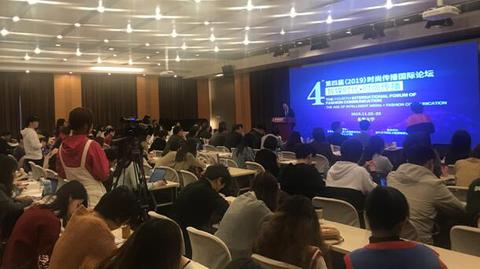On November 23, the Fourth International Forum on Fashion Communication was held at the Yan'an Campus. Qiu Gao, vice president, Qiang Ying, deputy director of the Shanghai Cultural and Creative Industry Office Promotion Leading Group, Meng Jian, vice president of the Chinese Association of Communication, and Chen Xianhong, vice president of the Chinese Association for History of Journalism and Mass Communication attended the opening ceremony and delivered speeches. Nearly 60 domestic and foreign experts and scholars from the State University of New York, Fudan University, Renmin University of China, Nanjing University, Shanghai Academy of Social Sciences, as well as operation managers from media organizations such as Eastday and the fashion industry gathered together for topic discussions.

(Qiu Gao delivered a speech on the conference)
Qiu Gao extended warm welcomes to the experts and scholars attending the forum. He said that fashion design, fashion art, and fashion industry research is one of the most characteristic fields of talent training and academic research in Donghua University. Donghua University's Fashion Culture and Communication Research Center relies on the school resources advantage, and focuses on the improvement of scientific research talents, discipline collaboration and innovation capabilities, and strives to build a comprehensive platform for inter-disciplinary and collaborative innovation. He hoped that this forum will play an important role in promoting in-depth thinking and communication between academia and industry, and creating an academic community in the field of fashion communication.
At the opening ceremony, Qiang Ying pointed out that cultural innovation, real economy, and open economy are the three driving forces of Shanghai ’s economic development. Fashion is also the focus of Shanghai’s development. Fashion communication can be complementary to the development of cultural and creative industries in Shanghai, the integration strategy of the Yangtze river delta, the development of International Cultural Industries Fair, and the dissemination of Shanghai culture. Meng Jian pointed out that Donghua University regards fashion communication as a new position and new starting point for the development of communication discipline at Donghua University, and has established a Fashion Culture and Communication Research Center, which has opened up a new field of communication research to a certain extent. He emphasized that fashion communication requires interdisciplinary breakthroughs, integrating multiple forces, and establishing an academic community. Chen Xianhong analyzed the advantages of blockchain technology and its application in the field of communication, and pointed out that influencers can exert their own power to spread positive energy and promote the core values of society.

(The Conference)
During the topic discussion, Zhu Qi, Executive Dean of Eastday Innovation Institute and Secretary-General of Eastdau Think Tank, proposed that the era of intellectual media has formed a closed business loop of “basing on sensing, analyzing demands, satisfying needs, and introducing products”, reducing everyone ’s communication cost. Communication is available to everyone. Hong Junhao, professor and PhD supervisor at the State University of New York and a researcher at Fairbank Center for Chinese Studies of Harvard University, started with keywords such as international communication, cultural industry, and national soft power, emphasizing the importance of fashion communication. Senior Corporate Communications Manager Esther Lauder (Shanghai) Chen Jie pointed out that the influence of electronic information and online media on the fashion industry is becoming increasingly prominent. E-commerce has changed the structure and form of fashion consumption. Scene establishment has become the strategic choice of fashion brands in this era, and scenes has become the core of brand communication.” Professor Hu Yiqing of Nanjing University traced back the dialectical relationship between fashion and communication, and answered what kind of differentiation is taking place in fashion when we enter the era of intelligent media such as vibrato and fast hand, pointing out that fashion populism is emerging Abdication and the rise of platform media. Professor Ren Hailong of Renmin University of China issued a question about Why there is no communication concept in Chinese, which inspired everyone to understand communication more fully.
In the sub-forum report, a heated discussion on topics like Mediated Society and Fashion in the Age of Intellectual Media, Fashion Symbols and Culture Studies in Transition, Fashion Body and Gender Studies, Fashion Production and Consumption under Digital Technology was unveiled among experts and scholars.
It is reported that this forum takes The Age of Intellectual Media·Fashion Communication as the theme, focusing on how intelligent media affects fashion, reshaping the new media landscape, and how intelligent fashion can subvert tradition, influence society, and revolutionize people’s lifestyles. Relying on the characteristics of fashion research, fashion education, Donghua University established a Fashion Culture and Communication Research Center in 2013. By integrating resources from communication, management, art, and design, it has studied fashion and its related cultural issues from the perspective of journalism and communication. In response to the fact that the existing journalism and communication major in China cannot meet the demand for diversified talents, and in order to meet the demand for the construction of Shanghai fashion capital, the school set up a new major, fashion communication, and open Excellent Fashion Communication Class. In 2019, it began to enroll postgraduates of fashion communication, exploring and practicing the reform of fashion communication education, so as to provide more high-level applied and compound talents for Shanghai's urban development and cultural construction.


